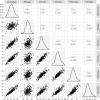PTSD is associated with accelerated transcriptional aging in World Trade Center responders
- PMID: 34031357
- PMCID: PMC8144188
- DOI: 10.1038/s41398-021-01437-0
PTSD is associated with accelerated transcriptional aging in World Trade Center responders
Abstract
Posttraumatic stress disorder (PTSD) is associated with shortened lifespan and healthspan, which suggests accelerated aging. Emerging evidence suggests that methylation age may be accelerated in PTSD. It is important to examine whether transcriptional age is also accelerated because transcriptome is highly dynamic, associated with age-related outcomes, and may offer greater insight into the premature aging in PTSD. This study is the first reported investigation of the relationship between transcriptional age and PTSD. Using RNA-Seq data from our previous study on 324 World Trade Center responders (201 never had PTSD, 81 with current PTSD, and 42 with past PTSD), as well as a transcriptional age calculator (RNAAgeCalc) recently developed by our group, we found that responders with current PTSD, compared with responders without a PTSD diagnosis, showed accelerated transcriptional aging (p = 0.0077) after adjustment for chronological age and race. We compared our results to the epigenetic aging results computed from several epigenetic clock calculators on matching DNA methylation data. GrimAge methylation age acceleration was also associated with PTSD diagnosis (p = 0.0097), and the results remained significant after adjustment for the proportions of immune cell types. PhenoAge, Hannum, and Horvath methylation age acceleration were not reliably related to PTSD. Both epigenetic and transcriptional aging may provide biological insights into the mechanisms underpinning aging in PTSD.
Conflict of interest statement
The authors declare no competing interests.
Figures



Similar articles
-
No association of posttraumatic stress disorder with epigenetic aging in women at mid-life: A longitudinal cohort study.Brain Behav Immun. 2025 Jan;123:672-680. doi: 10.1016/j.bbi.2024.10.003. Epub 2024 Oct 17. Brain Behav Immun. 2025. PMID: 39424013
-
Posttraumatic psychopathology and the pace of the epigenetic clock: a longitudinal investigation.Psychol Med. 2019 Apr;49(5):791-800. doi: 10.1017/S0033291718001411. Epub 2018 Jun 13. Psychol Med. 2019. PMID: 29897034 Free PMC article.
-
A DNA methylation clock associated with age-related illnesses and mortality is accelerated in men with combat PTSD.Mol Psychiatry. 2021 Sep;26(9):4999-5009. doi: 10.1038/s41380-020-0755-z. Epub 2020 May 7. Mol Psychiatry. 2021. PMID: 32382136
-
Epigenetic Contributors to PTSD: a Comprehensive Review.Psychiatr Danub. 2024 Sep;36(Suppl 2):180-187. Psychiatr Danub. 2024. PMID: 39378468 Review.
-
Epigenetic Clocks: In Aging-Related and Complex Diseases.Cytogenet Genome Res. 2023;163(5-6):247-256. doi: 10.1159/000534561. Epub 2023 Oct 28. Cytogenet Genome Res. 2023. PMID: 37899027 Review.
Cited by
-
Physical Functional Impairment and the Risk of Incident Mild Cognitive Impairment in an Observational Study of World Trade Center Responders.Neurol Clin Pract. 2022 Dec;12(6):e162-e171. doi: 10.1212/CPJ.0000000000200089. Neurol Clin Pract. 2022. PMID: 36540142 Free PMC article.
-
Epigenetic Age Acceleration and Disparities in Posttraumatic Stress in Women in Southeast Louisiana: NIMHD Social Epigenomics Program.JAMA Netw Open. 2024 Jul 1;7(7):e2421884. doi: 10.1001/jamanetworkopen.2024.21884. JAMA Netw Open. 2024. PMID: 39073815 Free PMC article.
-
Cumulative stress, PTSD, and emotion dysregulation during pregnancy and epigenetic age acceleration in Hispanic mothers and their newborn infants.Epigenetics. 2023 Dec;18(1):2231722. doi: 10.1080/15592294.2023.2231722. Epigenetics. 2023. PMID: 37433036 Free PMC article.
-
Associations of stress and stress-related psychiatric disorders with GrimAge acceleration: review and suggestions for future work.Transl Psychiatry. 2023 May 2;13(1):142. doi: 10.1038/s41398-023-02360-2. Transl Psychiatry. 2023. PMID: 37130894 Free PMC article. Review.
-
Free and Easy Wanderer Ameliorates Intestinal Bloating-Dependent Avoidance Behavior of Caenorhabditis elegans Through Gut-Germline-Neural Signaling.CNS Neurosci Ther. 2025 Feb;31(2):e70291. doi: 10.1111/cns.70291. CNS Neurosci Ther. 2025. PMID: 40008431 Free PMC article.
References
Publication types
MeSH terms
Grants and funding
LinkOut - more resources
Full Text Sources
Other Literature Sources
Medical
Molecular Biology Databases
Miscellaneous

